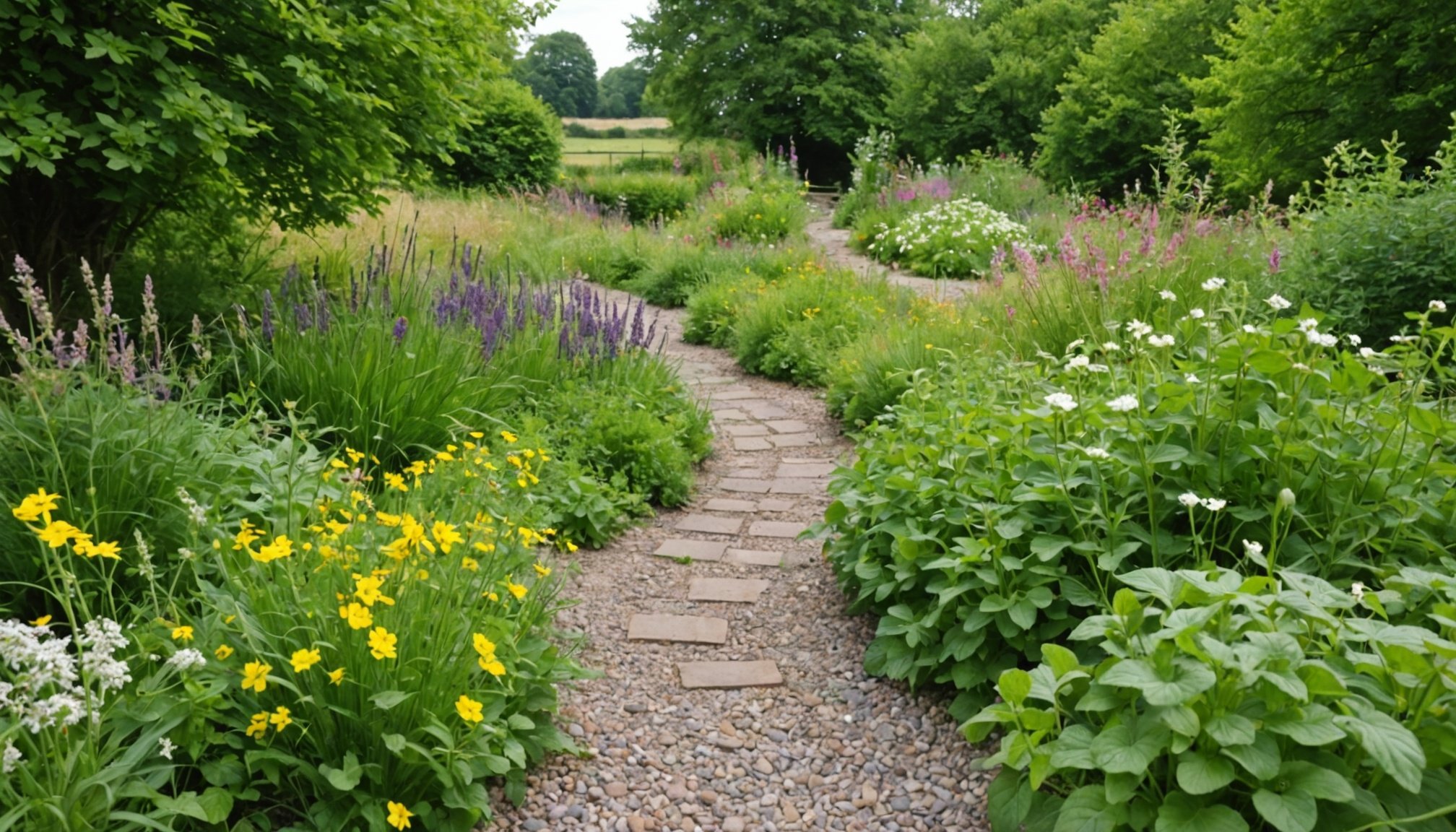Understanding Weeds in UK Gravel Pathways
Gravel pathways are a popular feature in UK gardens, but weeds can be a persistent issue. With various species thriving in these pathways, it’s important to identify and manage them effectively. Common weed species in UK gravel pathways include dandelions, clover, and chickweed. These plants not only disrupt the aesthetic appearance of your pathway but can also cause damage to surrounding areas by spreading rapidly and disrupting the health of nearby plants.
The impact of weeds on gravel pathways is significant. Weeds often compete with desirable plants for nutrients, light, and water, which can stifle garden growth. Additionally, their presence can lead to maintenance challenges, as they often cause the gravel to shift or become uneven, making pathways hazardous and less appealing.
A voir aussi : Mastering Peony Cultivation: Essential Tips for Thriving in the UK”s Humid Climate
Implementing organic management strategies to control weeds in gravel pathways is crucial. Such approaches can be beneficial for the environment and improve the overall health of your garden. Methods like hand-pulling, using natural weed suppressants, and maintaining a well-organised pathway can help manage weeds effectively. Being proactive about weed control not only preserves the appearance and function of gravel pathways but also supports sustainable UK gardening practices, ensuring a healthier garden ecosystem.
Effective Organic Weed Control Techniques
Organic weed control is an essential practice for maintaining healthy gardens without synthetic chemicals. By using methods such as hand weeding, mulching, and natural herbicides, gardeners can effectively manage weeds while contributing to environmental sustainability.
A lire en complément : Choosing the right camo netting shop online: what to look for
Hand Weeding Methods
Hand weeding is a practical method for controlling weeds, especially in smaller areas. For optimal results, it is crucial to understand the best practices and timing. Early morning, after rain or watering, is ideal since the soil is moist, making weed removal easier. Essential tools include a hand trowel, gloves, and a weeding fork. Regular hand weeding fosters a weed-free environment, preventing competition for nutrients among plants.
Mulching Strategies
Mulching, a prominent organic weed control technique, offers multiple benefits. Suitable mulch types like bark chips or straw can help suppress weeds in gravel pathways. To apply mulch effectively, spread a 2-3 inch layer over prepared soil. This layer not only prevents sunlight from reaching weed seeds but also retains soil moisture and regulates temperature. Over time, mulching enriches the soil as it decomposes.
Natural Herbicides
Several natural herbicides suitable for the UK include horticultural vinegar and clove oil. These solutions require precise application; use a spray bottle to target the weed foliage directly. It is important to ensure safety by wearing gloves and avoiding application on desired plants. Proper usage enhances the effectiveness of natural herbicides while maintaining garden health.
Preventive Measures for Weed Growth
Creating a weed-free gravel pathway begins with pathway preparation. Before laying any gravel, ensure the soil is compacted and level. Installing a weed barrier fabric is an essential step to deter aggressive weeds. This layer acts as a shield, restricting weed growth while allowing water and nutrients to seep through.
Regular gravel pathway maintenance reduces the likelihood of weed emergence. Routinely checking for gaps in the weed barrier fabric and replenishing gravel lost through weathering will help maintain its integrity. Periodically fluff the top layer of gravel; this disrupts potential weed seedlings and keeps the pathway visually appealing.
Incorporating organic gardening practices can enhance weed prevention. Surround your gravel paths with companion planting strategies. Certain plant combinations, like marigolds or basil, can deter weed growth naturally, providing a dual benefit of beauty and practicality.
For those with adjoining gardens, it’s critical to remain vigilant. Weeds can encroach upon gravel paths from nearby planters, so consider using edge barriers. These not only prevent weed invasion but can also organize and tidy your garden boundaries.
Embrace these strategies, and maintain a pristine, weed-resistant environment throughout your garden spaces, leveraging the multifunctional role of gravel pathways.
Recommended Products and Resources
Exploring organic gardening involves not only the use of natural products but also tapping into valuable resources for comprehensive knowledge. Whether you’re aiming for a robust weed management strategy or seeking educational materials, the UK offers a myriad of suppliers and resources to guide your journey.
Top Organic Products for Weed Management
Tackling weed without harming your garden is crucial. Popular organic herbicides such as vinegar and citrus-based sprays are effective in keeping your garden pristine without chemical interference. These products are perfect for those looking to maintain an eco-friendly approach. Additionally, eco-friendly tools like hand hoes and weed pullers are excellent for manual removal, ensuring precision and care for your plants. Purchasing from local UK suppliers not only supports the community but also reduces carbon footprint through decreased transportation needs. Online platforms and shops offer convenient access to a wide range of these products directly to your doorstep.
Educational Resources for Organic Gardening
Enhancing your knowledge through books and online platforms can profoundly enrich your gardening expertise. Community resources, such as gardening clubs, are abundant across the UK, fostering shared learning and experience exchange. Moreover, participating in workshops and courses will provide structured guidance on organic landscaping techniques and innovations, paving a pathway for both novices and seasoned gardeners to thrive sustainably.
Long-Term Monitoring and Maintenance
Ensuring gravel pathway care goes beyond initial construction, requiring a commitment to long-term monitoring and maintenance. A crucial aspect of sustainable gardening, ongoing observation helps manage potential weed resurgence effectively. Over time, weeds can creep back into pathways, but regular inspection can prevent their dominance.
Establish a routine for season-specific tasks to keep pathways pristine. During spring, focus on addressing sprouting weeds, while autumn may demand more intensive debris clearing to prepare for winter. These actions are part of keeping your garden’s ecosystem balanced.
Encouraging biodiversity is also an effective strategy for natural weed control. Sustainable gardening promotes the presence of beneficial insects and plants that naturally deter weeds. Introducing native ground cover plants can suppress unwanted growth by occupying available space and resources, thereby reducing the chance of weed proliferation.
Commitment to these practices ensures the longevity and aesthetic appeal of gravel pathways, supporting a vibrant and healthy garden environment. By integrating gravel pathway care into your regular gardening routine, you achieve not only a neat, tidy appearance but also contribute to environmental sustainability. The key lies in consistent effort and adaptation to seasonal needs, fostering a flourishing garden with minimal unwanted growth.











